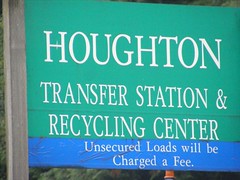 Image by vikisuzan via Flickr
Image by vikisuzan via FlickrFriedman's column emphasizes the multiple benefits, both predictable and less so, that flow from passing extended producer responsibility (EPR) laws. No reason these laws can't start in Oregon, one of the "laboratories of democracy."
. . . . This is a great opportunity for U.S. clean-tech firms — if we nurture them. "While the U.S. is known for radical innovation, China is better at tweak-ovation." said Liu. Chinese companies are good at making a billion widgets at a penny each but not good at complex system integration or customer service.
We (sort of) have those capabilities. At the World Economic Forum meeting here, I met Mike Biddle, founder of MBA Polymers, which has invented processes for separating plastic from piles of junked computers, appliances and cars and then recycling it into pellets to make new plastic using less than 10 percent of the energy required to make virgin plastic from crude oil. Biddle calls it "above-ground mining." In the last three years, his company has mined 100 million pounds of new plastic from old plastic.
Biddle's seed money was provided mostly by U.S. taxpayers through federal research grants, yet today only his tiny headquarters are in the U.S. His factories are in Austria, China and Britain. "I employ 25 people in California and 250 overseas," he says. His dream is to have a factory in America that would repay all those research grants, but that would require a smart U.S. energy bill. Why?
Americans recycle about 25 percent of their plastic bottles. Most of the rest ends up in landfills or gets shipped to China to be recycled here. Getting people to recycle regularly is a hassle. To overcome that, the European Union, Japan, Taiwan and South Korea — and next year, China — have enacted producer-responsibility laws requiring that anything with a cord or battery — from an electric toothbrush to a laptop to a washing machine — has to be collected and recycled at the manufacturers' cost. That gives Biddle the assured source of raw material he needs at a reasonable price. (Because recyclers now compete in these countries for junk, the cost to the manufacturers for collecting it is steadily falling.)
"I am in the E.U. and China because the above-ground plastic mines are there or are being created there," said Biddle, who just won The Economist magazine's 2010 Innovation Award for energy/environment. "I am not in the U.S. because there aren't sufficient mines."
Biddle had enough money to hire one lobbyist to try to persuade the U.S. Congress to copy the recycling regulations of Europe, Japan and China in our energy bill, but, in the end, there was no bill. So we educated him, we paid for his tech breakthroughs — and now Chinese and European workers will harvest his fruit. Aren't we clever?






No comments:
Post a Comment